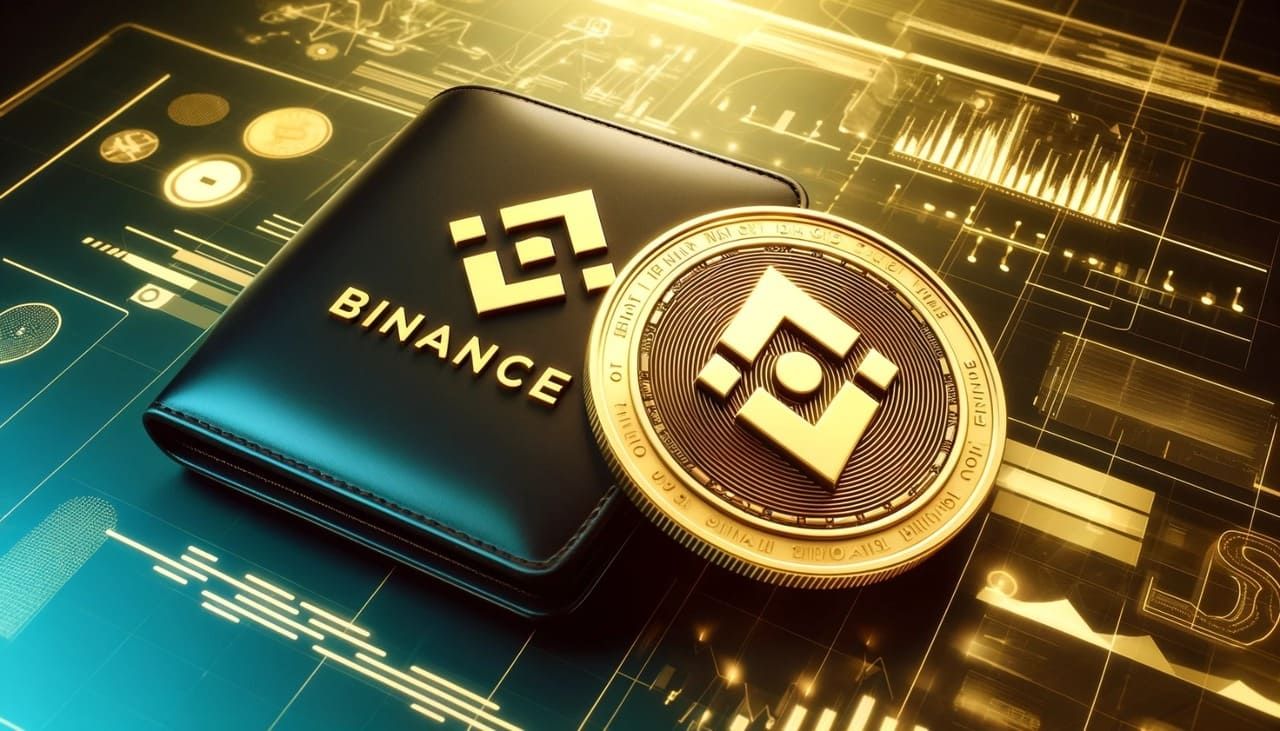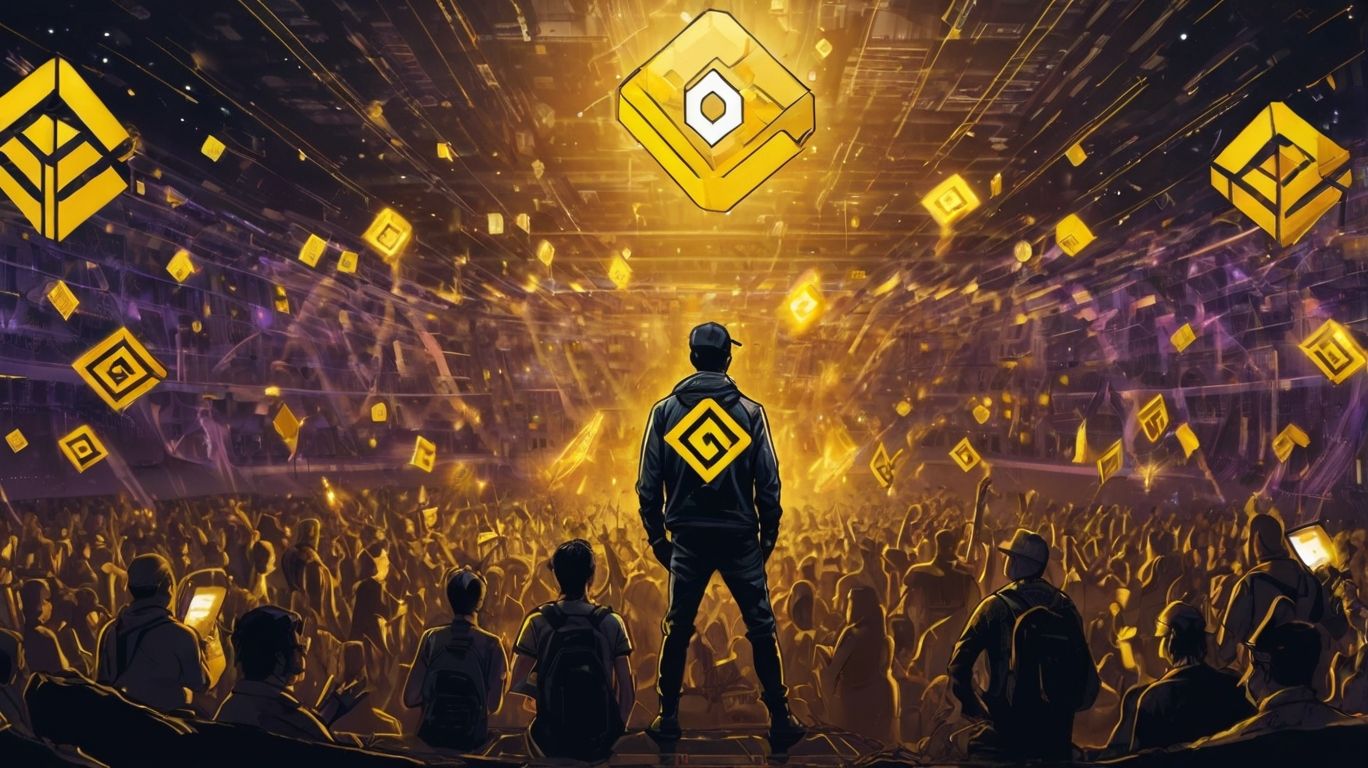Binance's BNB irresistible rise in the world of cryptocurrency
#binance #bnb

Binance uses Binance Coin, also known as Binance BNB. It was launched through an initial token offering (ICO) in 2017
Content:
- The Founders of Binance
- What was the inspiration for the creation of Binance
- How did Binance become one of the largest cryptocurrency exchanges
- What is the mission of Binance BNB
- Analysis of BNB's White Paper
- Utility and value proposition of BNB
- BNB's buyback and burn program
- Allocation of funds raised
- How Binance's BNB token differs from other cryptocurrencies
- Binance's involvement and support
- BNB's protocol and innovation
- What is and how does the BNB chain innovation roadshow work
- How the Innovation Roadshow works
- Curated selection
- Workshops and Roundtables
- Networking Opportunities
- Global Scope
- The Binance BNB incentive structure
- BNB offers staking service
- Historical lows and highs of the BNB token
- How many BNB tokens were sold in the initial offering and at what price
- Binance's successful partnerships
- Partnership between Xterio and BNB Chain
- Potential partnerships within the Binance ecosystem
- The future of Binance
- 14 FAQs on BNB Binance
- 1. What is Binance Coin (BNB)?
- 2. How does BNB work within the Binance ecosystem?
- 3. Does BNB have value?
- 4. What are the benefits of using Binance Coins?
- 5. What is the minimum amount required for BNB stacking?
- 6. Where can I purchase Binance coins?
- 7. What is the Binance Smart Chain (BSC)?
- 8. How does the token burn mechanism work for BNB?
- 9. What is BNB's total supply?
- 10. What are the differences between BEP-20 and BEP2 on the BNB chain?
- 11. How can I store and send BNB?
- 12. What are the key factors contributing to the rise in the price of BNBs?
- 13. What are the use cases of BNB within the Binance ecosystem?
- 14. How can I integrate Binance Smart Chain into my portfolio?
Binance BNB is one of the best-known cryptocurrency exchanges in the world. We analyze here the factors that have made Binance successful.
Binance has a limited total supply that is reduced through a quarterly process called “burn.”
BNB is one of the most widely used cryptocurrencies globally and plays an important role within the Binance ecosystem. It is often used as a means of paying trading commissions. in fact, it is used to pay trading commissions on Binance, Binance DEX (Binance's decentralized exchange) and Binance Chain and in addition, discounts can be obtained.
It is also used as a Utility Token: It can be used to pay for goods and services, participate in initial exchange offerings (IEOs), and access exclusive features within the Binance ecosystem.
Initially, BNB operated on the Ethereum blockchain as an ERC-20 token. At the time, the main purpose was to facilitate transactions on the Binance platform and provide users with reduced trading fees when using BNB for payments.
Later BNB underwent a significant transformation when it became the native currency on the Binance blockchain, known as the Binance Chain.
This transition allowed BNB to serve as a “gas” token for transactions on the Binance Chain network.
The Founders of Binance
Binance was founded in 2017 by Changpeng Zhao (also known as CZ), a Chinese-Canadian entrepreneur.
Prior to founding Binance, Changpeng Zhao had experience in the technology industry, including creating high-frequency trading software at a company called Fusion Systems, which he founded in 2005.
Zhao also previously worked at cryptocurrency companies such as Blockchain.info and OKCoin before founding Binance with his partner Yi He.
Binance was initially based in China, but in 2017 it moved its servers and headquarters out of the country in view of the Chinese government's ban on cryptocurrency trading.
Since then, Binance has been operating without an official headquarters, with the company registered in the Cayman Islands.
What was the inspiration for the creation of Binance
Changpeng Zhao (CZ) thought that the world really needed a reliable and global cryptocurrency trading platform that could handle high trading volumes.
CZ's desire is to “trade the world” through new cryptocurrency trends and to provide an easy-to-use platform for global traders to access and use cryptocurrencies.
CZ saw an opportunity to leverage its technical expertise and the growing popularity of cryptocurrencies to build a world-leading cryptocurrency trading platform to meet growing global demand.
How did Binance become one of the largest cryptocurrency exchanges
CZ and its co-founder Yi He leveraged the strategy of “blitzscaling,” a high-risk, high-return growth approach that prioritizes rapid expansion to dominate a market before competitors can catch up.
Some key elements underlying Binance's blitzscaling strategy were:
1. Business model innovation - Binance introduced its own utility token, BNB, which allowed users to get discounts on trading fees. This contributed to the rapid growth of users.
2. Innovation in strategy - Binance quickly introduced new cryptocurrencies at a rapid pace, making it an attractive exchange for traders. It has also moved its headquarters to Malta, a cryptocurrency-friendly jurisdiction.
3. Innovation in management - Binance has been able to handle huge trading volumes and user growth through technical innovations such as the ability to process 1.4 million orders per second.
Binance also benefited from the overall growth of the cryptocurrency market in 2017-2018, rapidly gaining market share through its innovative approach.
The combination of CZ's vision, Binance's technical capabilities, the BNB token, and the overall boom in the cryptocurrency market allowed Binance to become the world's largest cryptocurrency exchange in a remarkably short period of time.
What is the mission of Binance BNB
The mission of Binance BNB, now known as BNB Chain, is to build the infrastructure that powers the world's virtual ecosystem.
BNB Chain aims to create an open, multi-chain, permissionless, decentralized ecosystem forever beyond Binance. It is designed to be larger and separate from Binance, focusing on innovation and interoperability to cater to more than 1 billion users globally.
The MetaFi concept is at the heart of the BNB Chain, with the goal of uniting different blockchain capabilities under one umbrella, including DeFi, GameFi, SocialFi, NFT and others, to offer users new use cases and promote mass adoption of the metaverse.
Analysis of BNB's White Paper
Here is a brief analysis of the key points of BNB's White Paper:
BNB token allocation
- BNB's total supply is set at 200 million tokens.
- 50% of BNB's offering was earmarked for public purchase during Binance's initial coin offering (ICO).
- 40% of BNB was reserved for the founding team.
- 10% was allocated to angel investors who supported Binance in the early stages.
Utility and value proposition of BNB
- BNB can be used to pay trading fees on the Binance exchange, often at a discounted rate.
- BNB can be used to participate in token sales hosted on Binance's Launchpad platform.
- BNB is accepted as a payment method by several merchants worldwide.
BNB's buyback and burn program
Binance uses a portion of its profits to regularly buy back and permanently destroy (“burn”) BNB tokens.
This buyback program will continue until 50% of the total BNB supply (100 million BNB) has been burned, thus reducing the total supply.
Allocation of funds raised
Thirty-five percent of the funds raised are being used to strengthen Binance's technological infrastructure and capabilities.
The funds are also being used to ensure device and platform compatibility, as well as multilingual support, to serve Binance's global user base.
In summary, the BNB white paper outlines the limited supply of the token, its diverse utility within the Binance ecosystem, and Binance's commitment to a strategic buyback program to manage BNB's scarcity and value over time.
How Binance's BNB token differs from other cryptocurrencies
BNB was initially issued as an ERC-20 token on the Ethereum blockchain, but has since migrated to the BNB Chain, the blockchain network owned by Binance.
This transition allows BNB to take advantage of the benefits of the BNB Chain, such as faster transaction times and lower fees.
Binance's involvement and support
Binance, as the creator of BNB, is deeply involved in the development and growth of the BNB ecosystem.
This close relationship between Binance and BNB differentiates it from other cryptocurrencies that may not have the same level of support from their parent organizations.
Another factor that sets BNB apart from other cryptocurrencies is that BNB is uniquely positioned as a native token in the Binance ecosystem, with a specific utility, a strategic buyback program, and a close link to the Binance platform and its development.
BNB's protocol and innovation
The innovation of BNB lies in its evolution into BNB Chain, which serves as the basic infrastructure for the global virtual ecosystem. BNB Chain, through the MetaFi concept, aims to empower creators, developers and entrepreneurs to build for MetaFi, a blend of metaverse, DeFi, GameFi, SocialFi, Web3 and NFT under one umbrella.
The transition from Binance Smart Chain to BNB Chain involves significant technical upgrades, including Bruno's hard fork, a new BNB Auto-Burn protocol, large-scale applications such as GameFi and SocialFi, on-chain governance mechanisms, scaling solutions, and expansion of the validator set.
BNB Chain remains community-driven, open-source and decentralized, with a focus on MetaFi to unite various blockchain features into one interoperable ecosystem, promoting mass adoption of the metaverse and providing users with new use cases.

What is and how does the BNB chain innovation roadshow work
To provide assistance to its community and strengthen its loyalty, Binance BNB Chain Innovation Roadshow is a series of events that brings together developers and builders to learn, network, and share innovative ideas on the Web3 space.
The BNB Chain Innovation Roadshow is a series of free one-day events that provides a platform for skills enhancement, connection building, and community engagement, all while fostering the growth of the BNB Chain ecosystem.
How the Innovation Roadshow works
Curated selection
Entries are rigorously curated to ensure that only high-quality participants are selected for each event. This ensures that the best and most relevant people in the Web3 community attend the events.
Workshops and Roundtables
The events feature workshops and panel discussions focused on cutting-edge Web3 skills and topics. These sessions are designed to amplify participants' skills, increase their connections, and empower them to contribute to the development of the BNB chain.
Networking Opportunities
The Innovation Roadshow provides a platform for participants to connect with fellow manufacturers, leading experts and other industry professionals. This fosters innovation, collaboration and the exchange of ideas.
Global Scope
The Innovation Roadshow is held in various locations around the world, making it accessible to developers and builders worldwide. The events are free of charge and held in English, with careful selection of applicants to ensure the best participants attend.
The Binance BNB incentive structure
BNB has an incentive structure. The BNB Chain offers several incentive programs, such as the Daily Active Users (DAU) Incentive Program and the Total Value Locked (TVL) Incentive Program, to reward projects and developers that build on the BNB Chain ecosystem. These programs offer rewards in BNB tokens, with prizes ranging from a maximum of $200,000 in the DAU Incentive Program to a maximum of $160,000 in the TVL Incentive Program. These incentives aim to encourage innovation, growth and participation within the BNB Chain ecosystem.

BNB offers staking service
BNB offers staking. Users can stake their BNB tokens to contribute to the security of the BNB network and earn rewards. BNB staking allows users to earn rewards on their BNB holdings that would otherwise remain idle in a wallet.
Rewards for BNB staking can vary, with different platforms offering different annual percentage yields (APY) ranging from 0% to 25%. BNB staking is a way to actively participate in network security and earn rewards in return.
The minimum amount of BNB required to start staking is 1 BNB.
Historical lows and highs of the BNB token
Today's price USD 582.00
Market cap 85,990,245,023 USD
Total bid 147,587,160
Circulating bid 147,587,160
Historical high 690.93 USD 10/05/2021
Historical low 0.09611 USD 01/08/2017
How many BNB tokens were sold in the initial offering and at what price
In the initial offering, 100 million units of BNB tokens were sold. The issuance price during the initial offering was 1 ETH for 2,700 BNB or 1 BTC for 20,000 BNB, equivalent to about US$0.11 at that time.
Binance's successful partnerships
BNB (Binance Coin) has formed successful partnerships, particularly with Airbnb
Airbnb collaborated with BNB to create a unique “Van Gogh BNB” experience, in which users could book a stay in a room inspired by Van Gogh's artwork.
This collaboration was considered a success in terms of marketing and branding, as it allowed Airbnb to create an “intimate brand connection” and offer a unique experience to its users.
Partnership between Xterio and BNB Chain
Xterio, a leading web3 game publisher, has partnered with BNB Chain to extend its game offerings on a games-specific Layer 2 blockchain.
With the help of this partnership, web3 gaming will be transformed by using the potential of BNB as a gas token and improving the infrastructure of the BNB Chain ecosystem.
It is expected that the partnership between Xterio and BNB Chain will lead to important developments for the blockchain game industry.
Potential partnerships within the Binance ecosystem
The BNB Chain ecosystem could also offer opportunities for additional partnerships that could further enhance the utility and value of the BNB token.
As a native BNB Chain cryptocurrency, BNB may have partnered with various projects and applications built on the Binance ecosystem.
These partnerships could potentially foster the adoption and use of BNB within the broader Binance ecosystem, contributing to the growth and success of the token.
The future of Binance
The future of Binance Coin (BNB) looks promising based on several price forecasts ranging from 2024 to 2030. Analysts predict that the value of BNB could reach significant levels in the coming years. By the end of 2024, BNB is expected to have a minimum price of about $330 and a maximum price of $645. Looking forward, in 2025, BNB is expected to reach a maximum price of about $840, with a minimum price level of about $692.
Long-term forecasts for 2030 indicate that BNB's potential maximum could be $2296, with a minimum of $1947. These forecasts indicate a positive trajectory for BNB, reflecting optimism in its future growth and market performance.
14 FAQs on BNB Binance
1. What is Binance Coin (BNB)?
Binance Coin is the official cryptocurrency issued by Binance, used for various transactions on the Binance Exchange.
2. How does BNB work within the Binance ecosystem?
BNB operates as a utility token within the Binance ecosystem, offering benefits such as discounts on transaction fees, participation in token sales, and access to advanced platform features.
3. Does BNB have value?
BNB has gained value over time due to its utility within the Binance platform, limited supply, and token burn mechanism that reduces supply and potentially increases value.
4. What are the benefits of using Binance Coins?
BNBs offer benefits such as trading fees on the Binance Exchange, trading with other cryptocurrencies, paying for goods and services, staking, and investing in stocks and ETFs.
5. What is the minimum amount required for BNB stacking?
The minimum amount for stacking is 1 BNB.
6. Where can I purchase Binance coins?
BNBs can be purchased on the Binance exchange or other cryptocurrency exchanges such as Coinbase, using local currency on some exchanges known as crypto on-ramps.
7. What is the Binance Smart Chain (BSC)?
The BSC is an Ethereum-compatible blockchain developed by Binance in 2020 to support decentralized finance (DeFi) apps and improve the functionality and utility of BNB.
8. How does the token burn mechanism work for BNB?
Binance periodically repurchases and burns a portion of BNB's total supply, reducing the overall supply and potentially increasing the value of the remaining tokens.
9. What is BNB's total supply?
BNB's total supply is limited to 200 million coins, creating a scarcity that could drive up its value over time.
10. What are the differences between BEP-20 and BEP2 on the BNB chain?
BEP-20 is the standard BNB Chain token, based on Ethereum's ERC-20 standard, while BEP2 is the standard Binance Chain token.
11. How can I store and send BNB?
BNB is stored in a wallet where you keep the private key for access. To send BNB, you use a BNB Chain wallet such as Bridge Wallet to choose the amount and destination address.
12. What are the key factors contributing to the rise in the price of BNBs?
Factors such as the steady development of the community, the growth of DeFi projects on BSC, the general growth of the cryptocurrency industry, and the support of the community have contributed to the increase in the price of BNB.
13. What are the use cases of BNB within the Binance ecosystem?
BNB can be used to pay transaction fees on Binance, participate in token sales, access advanced features of the platform, and more, offering various benefits to users.
14. How can I integrate Binance Smart Chain into my portfolio?
To integrate Binance Smart Chain into your wallet, you can refer to the guide on how to add Binance Smart Chain to MetaMask for step-by-step instructions.